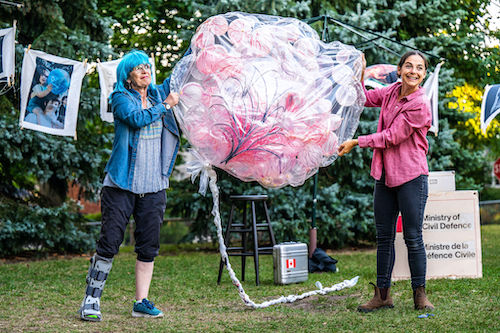
It’s a beautiful day for an apocalypse in Hillcrest Park. The sky is blue and children swarm the playground. Meanwhile, feminist theatre-makers and real-life mother-daughter team Kate Lushington and Natasha Greenblatt showcase their new work, Apocalypse Play – presented by Two Birds Theatre Company in association with Common Boots Theatre.
Greenblatt begins by explaining the play’s premise. She tells the audience that her intent was to create a third chapter to two of Lushington’s short satirical works set in the aftermath of a nuclear war.
These best-laid plans quickly go awry, however, as we instead watch a biting commentary on generational differences in arts-based activism and perceived existential threats. More than that, it’s also a story about the uneasy relationship between mother and daughter. and the lines between creation and capitulation, legacy and settling.
It’s messy, funny, thoughtful, and painful; an engrossing way to spend an hour.
ahdri zhina mandiela’s direction and Astrid Janson’s design in the modest performance space at Hillcrest Park provide many moments of striking visual interest.
As the actors emerge in full hazmat gear and bright blue wigs, Greenblatt pulls her mother to the stage in a little red wagon. Marking off the requisite six feet of distancing space, Greenblatt is framed by screen-printed family photos from varying eras, clipped to a line, which wave in the breeze. A bag of balloons, which becomes a hilarious stand-in for a placenta, takes pride of place in the centre.
This cheerful display contrasts merrily with the retro Cold War PSA aesthetic of Lushington’s artistic persona. She is the supposed head of the mental health division of the government’s Department of Emergency Preparedness. Her drily satirical scenes about using kits filled with household objects to rediscover grief and sexuality post-nuclear devastation leave us stewing in discomfort for that critical second too long before the chuckle kicks in.
The mother-daughter chemistry runs hot and cold here, as the women circle each other warily. They exchange moments of warmth while keeping each other at arm’s length. It’s a sign of the tensions and upheavals to come when mother and daughter can’t even agree on the show’s name. Greenblatt protests her mother’s preferred title as appropriative, and Lushington proclaims Greenblatt’s dry descriptor to be lacking in fun.
As they trade-off in reenacting the past, Lushington views Greenblatt as ‘auditioning’ for her spot in both theatre and life. Greenblatt sees the role as her natural inheritance. The gradual breakdown of their planned show, given this metaphorical tug-of-war, is inevitable but effective.
I appreciated the play’s relative even-handedness when it came to the views and experiences of its main characters. It deals compassionately with the flaws of both instead of taking sides.
By primarily focusing on nuclear war and climate change topics, the script manages to reference our other current horror of mass death without seeming like a play “about” the pandemic. Its forays into topics such as psychic numbing, survivor’s guilt, and an inability to grieve without the performance of ritual feel timeless, rather than overbearing.
I would love to see an expanded version of the show, which currently moves at a fairly furious clip. The complexity of the familial relationship deserves some additional time. Some of the foreshadowing in this version occurs nearly on top of the resulting revelation. Given a little more breathing room, these segments would match the play’s focus and presence during the reenactments.
Apocalypse Play reminds me a great deal of one of my favourite plays – Lisa Kron’s Tony-nominated, Well. It’s another work where a woman brings her mother onstage to grapple with her legacy, and expresses her admiration for her mother’s achievements while trying to distance herself from mom’s perceived failures. Both plays contain constant commentary about themselves as theatre, professing anxiety about the inadequacy of the theatrical form to answer the big questions that plague us.
Theatre may always be better at asking the big questions than answering them. But there’s a lot of delight to be had in the asking. Apocalypse Play made me deeply grateful to be in the presence of live, in-person theatre again.
Like the physical “grief box” in the show, which allows one to reconnect with one’s emotions, it reminds us that we’re still here, even if we’re not sure what that means. And that if all else fails, you can always dance.
Details:
- Apocalypse Play runs until September 19, 2021, at Hillcrest Park (950 Davenport Road).
- Shows are Friday at 5:00PM and Saturday-Sunday at 2:00PM.
- Tickets are free, but you must register in advance online.
- The September 18 show includes a post-show talkback with Women and Gender Studies students. Audience members are invited to bring their mother, mother figure or object representing them.
- The show discusses sexual content and may not be suitable for young children.
Photo of Kate Lushington and Natasha Greenblatt by Dahlia Katz
